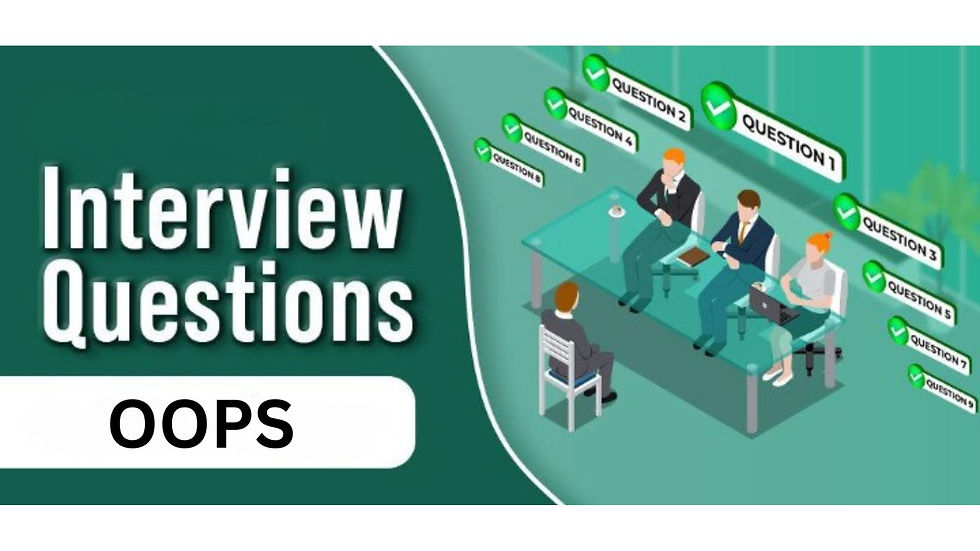Mastering Object-Oriented Programming: Interview Questions for Freshers
- Divyansh WsCube
- Oct 19, 2023
- 4 min read

Introduction
So, you've decided to take the plunge into the world of software development. You've learned the basics of Object-Oriented Programming (OOP), and now you're gearing up for your first job interview. Congratulations on reaching this milestone! To help you prepare, we've compiled a list of common OOPS interview questions and answers that are often asked of freshers. Let's dive in.
1. What is Object-Oriented Programming?
This is the fundamental question that often kicks off the interview. You should provide a clear and concise explanation of OOP, highlighting its core principles: classes, objects, encapsulation, inheritance, polymorphism, and abstraction.
2. What is a Class and an Object?
A class is like a blueprint for creating objects, while an object is an instance of a class. Think of a class as the recipe, and an object as the dish prepared following that recipe.
3. Explain Encapsulation.
Encapsulation involves bundling data (attributes) and the methods (functions) that operate on the data into a single unit, an object. It's like packaging ingredients and cooking instructions together.
4. What is Inheritance?
Inheritance allows one class (the child or subclass) to inherit properties and methods from another class (the parent or superclass). It's akin to inheriting traits from your parents or grandparents.
5. Define Polymorphism.
Polymorphism enables objects of different classes to be treated as objects of a common base class. It's similar to using a universal remote control for different devices, even though they function differently.
6. What is Abstraction?
Abstraction simplifies complex systems by breaking them into smaller, manageable parts. It's like using a user manual that provides high-level instructions without revealing the inner workings.
7. How do you declare a class in Python/Java/C++?
Depending on the programming language you're familiar with, you should provide the syntax for defining a class.
8. Differentiate between a Class and an Object.
Explain the distinction between a class, which is the blueprint, and an object, which is a specific instance created from that blueprint.
9. What is the 'new' keyword used for in OOP?
The 'new' keyword is used to create an instance of a class, which is essentially an object.
10. How does Inheritance work in OOP?
Describe how inheritance allows a class to inherit properties and methods from another class, and explain the concepts of the superclass and subclass.
11. Give an example of Polymorphism.
Provide a practical example of polymorphism, such as different shapes (circles, triangles, rectangles) sharing a common 'area' method but with different implementations.
12. Explain the importance of Encapsulation in OOP.
Discuss how encapsulation protects data by preventing unauthorized access and modification, and how it promotes data integrity.
13. How do you achieve Abstraction in OOP?
Explain how abstraction simplifies complex systems by providing high-level, user-friendly interfaces, and why it's essential for managing complexity.
14. What are Constructor and Destructor methods?
Discuss the purpose of constructor methods (used for initializing objects) and destructor methods (used for releasing resources and performing cleanup).
15. Give an example of OOP in a real-world scenario.
Provide an example of how OOP principles can be applied in a real-world context, such as modeling a banking system or a library management system.
16. What are the key benefits of OOP?
Enumerate the advantages of OOP, such as code reusability, maintainability, and modularity.
17. Describe the SOLID principles in OOP.
Explain each of the SOLID principles (Single Responsibility, Open/Closed, Liskov Substitution, Interface Segregation, Dependency Inversion) and their significance in OOP.
18. How does OOP differ from other programming paradigms, such as procedural programming?
Compare OOP to other paradigms and explain why OOP is preferred in certain scenarios.
19. Provide an example of multiple inheritance and how it's handled in OOP.
Discuss the challenges of multiple inheritance and how some languages address them using interfaces or abstract classes.
20. What is the 'this' keyword, and when is it used?
Explain the purpose of the 'this' keyword in OOP, used to refer to the current instance of a class.
21. How do you achieve method overloading and overriding in OOP?
Describe how method overloading allows the same method name with different parameters, while method overriding involves redefining a method in a subclass with the same name and parameters.
22. Can you create an abstract class, and what is it used for?
Discuss how abstract classes cannot be instantiated but serve as a blueprint for other classes. Explain their use in providing common attributes and methods to subclasses.
23. What is the purpose of the 'super' keyword in OOP?
Explain how the 'super' keyword is used to call methods or constructors from the superclass.
24. How does OOP relate to real-world software development?
Illustrate how OOP principles are applied in the development of software systems, emphasizing their significance in creating modular and maintainable code.
25. Can you provide an example of a real-world project or application where OOP principles are essential?
Share an example of a project or application that benefits from OOP principles, and explain how these principles enhance the design and functionality.
Preparing for OOP Interview Questions
To prepare effectively for OOP-related interview questions, it's crucial to understand the core principles and be able to provide clear and concise explanations. Additionally, practice coding exercises that involve creating classes, objects, and demonstrating inheritance and polymorphism. Real-world examples and practical scenarios can also help you demonstrate your knowledge effectively.
Remember to be confident in your responses, but also be open to discussing your thought process and learning from the interview experience. With a solid understanding of OOP, you'll be well-prepared to tackle these OOPS interview questions and answers make a strong impression as a fresher in the world of software development. Good luck!



Comments